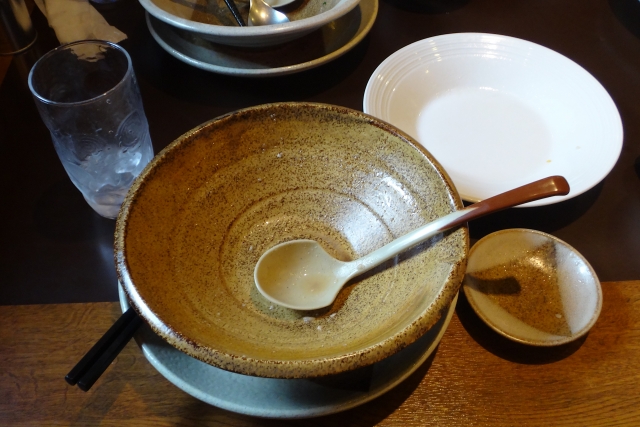What does “gochisousama” mean? What in English? ごちそうさま

Japanese often say the following phrases when having a meal.
All three have the same meaning.
“Gochisousama(ごちそうさま)"
“Gochisousamadeshita(ごちそうさまでした)"
“Gochisousan(ごちそうさん)"
In addition to the above, the phrase “itadakimasu(いただきます)" is also often used. There are other phrases about having a meal, but these two, “gochisou sama" and “itadakimasu" are the phrases that it would be nice for you to remember if you visit or live in Japan or have a chance to have a meal at a Japanese home.
What does “gochisousama" mean?
“Gochisousama" is a greeting after a meal in Japan. Conversely, “itadakimasu(いただきます)" before a meal.
Both are used in the sense of gratitude to those who have prepared the meal and the ingredients by holding hands or bowing lightly.
The origin of 「gochisousama」
“Gochisousama" is easy to understand if it is divided like “go-chisou-sama".
First, the part “chisou" is written as “馳走(ちそう)", which means “run around" or “run on a horse".
In the past, there were no supermarkets that were always open in the neighborhood or online shopping, so people often rushed to get food and prepare meals for their customers.
It is believed, therefore, that the entertainer referred to such efforts as “go-chisou" with appreciation. “Go" is a prefix used to express polite feelings.
In addition, add “sama(様)" as a suffix to express a polite feeling toward the hospitality.
It is written in Kanji as “ご馳走様.”
It is an old word found in old Chinese documents. Since it came to Japan, it has become meaning “to take care" and “to look after."
Then, it changed the meaning to a state of rushing to prepare for hospitality, a feeling of appreciation for the care and hospitality, delicious food and treats.
However, it has been used in recent decades for general greetings after meals.
The noun “gochisou" alone means “a feast".
Gochi ni narimasu(ゴチになります)
Recently, “gochi(ゴチ)", a shortened version of “gochisousama", has been used as slang by young people or some adults.
This is a word that came out of a project in a television program.
The project took place in a restaurant. Performers order some food from the menu. At the end of the meal, they compete to guess the total price of the meal they ate each.
The rule is that if you lose, you must pay for all the meals you eat.
So, the others say, “gochi ni narimasu(ゴチになります)" when the loser pays.
This implies “Thank you for a delicious meal".
From here, its use spread throughout the country. Therefore, when the word “gochi" is used, it often becomes the phrase “Gochi ni narimasu", like that TV program.
Thank you for buying me a meal.
“Gochisousama" is also used when receiving food or getting paying for somebody’s meal.
For example, suppose someone went on a holiday and bought some food for you as a souvenir. When you get it, it would be nice to say:
Arigatou.
ありがとう (Thank you)
Arigatou gozaimasu.
ありがとうございます。(Thank you) (polite)
Gochisousama.
ごちそうさま。
Gochisousama desu.
ごちそうさまです。(polite)
Also, suppose that you go out to eat with someone and that person pays for all the meals. In that case, you could say:
(Note: those polite sentences are past tense as the phrases are used after a meal)
Arigatou.
ありがとう (Thank you)
Arigatou gozaimashita.
ありがとうございました。(Thank you) (polite)
Gochisousama.
ごちそうさま。
Gochisousama deshita.
ごちそうさまでした。(polite)
Also, I would like to add this:
For example, suppose you eat out with someone. Like in any restaurant, you pay when you’re done, right?
If there is more than one person, it may be natural to think to pay for the meal equally split.
However, if the person with you says “gochisousama" to you before paying anything, that person is likely to have you pay for the meals. Yes, it sounds cheeky.
This is not one of Japanese games where the person who has said it first wins, so if you feel that the bill should be equally split, just state it clearly.
And, please do not abuse it, either.
Example using “gochisousama"
Gochisousama.
ごちそうさま
Thank you for the meal.
Gochisou sama, totemo oishikatta yo.
ごちそうさま、とても美味しかったよ。
It was very delicious.
Gochisousan. (Casual)
ごちそうさん
Thanks for the meal.
Gochisousamadeshita. (Polite)
ごちそうさまでした。
It was very delicious.
Gochisousamadeshita, totemo oshikatta desu. (Polite)
ごちそうさまでした、とても美味しかったです。
It was very delicious.
















